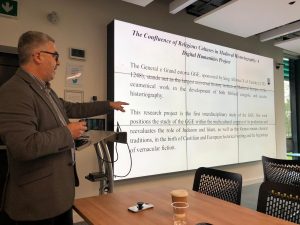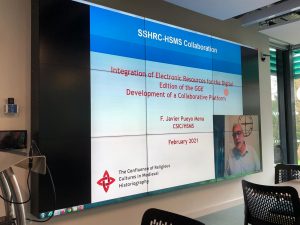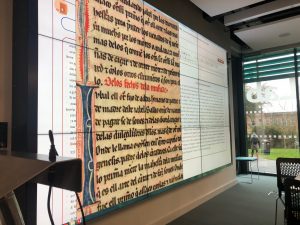
Dr. Peña Fernandez (centre) with faculty members at the University of Exeter
Between Feb. 12 and Feb. 19, 2020, Francisco Peña Fernandez, Associate Professor in the Department of Languages and World Literatures at UBC Okanagan, visited the University of Exeter to discuss a collaboration with the Exeter Digital Humanities Lab.
The visit was hosted by the Exeter Digital Humanities Lab and was focused on developing stronger bridges in research and collaboration between the two institutions. The research priorities and synergies between faculty members at both institutions are in the fields of medieval religious cultures, digital humanities and interdisciplinary studies.
Francisco Peña Fernandez is leading a group of scholars working in the SSHRC funded project “Confluence of Religions in Medieval Spanish Historiography’’. One of the main goals of this project is to produce a scholarly, critical, and annotated digital edition of the first volume of the General e Grand Estoria (General Estoria), the most expansive 13th-century book written in Spanish and the largest universal history written in Medieval Europe.
The University of Exeter has a number of scholars whose expertise make them perfect partners to collaborate with the project. Dr. Peña Fernandez will work with scholars and students from Exeter to create the first translation of the GGE into English in print. An accurate first translation into English of the first volume will create innumerable research possibilities for historians, philosophers of history and religion, linguists, traductologists, and specialists in literary studies and the history of narratology.
The visit to Exeter has allowed for further international collaboration and dissemination of research in the area of Digital Humanities, Medieval Studies, Religious Studies and Translation Studies, explains Dr. Peña Fernandez.
“We are creating a new methodology of study, involving digital media, creating new tools for innovative interdisciplinary study of the Middle Ages,” Peña says.
“The idea of people who specialize in different fields communicating and working together is also an important part of the project—it mirrors the way this book was originally written.”
During his visit, Dr. Peña Fernandez was engaged in a number of activities related to his research, and was offered opportunities to connect with others in the field at the University of Exeter. He conducted a workshop that addressed digital humanities; he participated in lectures, meetings with dignitaries and academicians from different fields, as well as meetings with students.
ABOUT THE EXETER UBC PARTNERSHIP
The University of British Columbia, Okanagan, entered into a Statement of Cooperation with the Exeter College of Humanities in the spring of 2018, with the aim to strengthen the relationship between the universities, and nurture a collaborative approach to education, research and academic exchanges.
Faculty members and students from both institutions have had opportunities to travel back and forth over the last year two years. This past year the creation of an Exeter/UBC Humanities Collaboration Fund has increased the opportunities to both build on existing collaborations and to develop new links.



